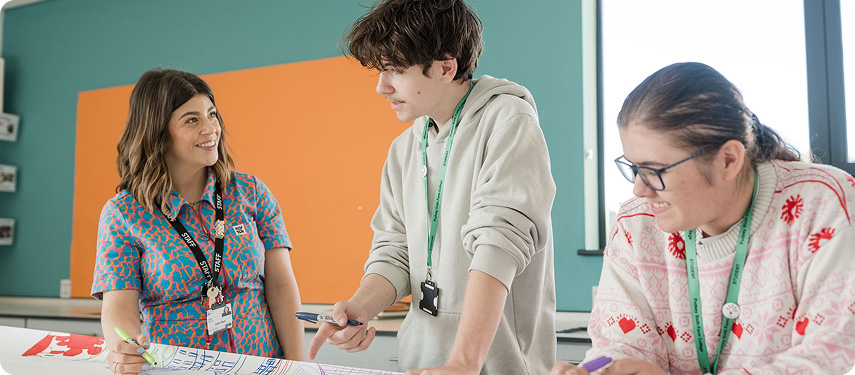

Typically you will choose three A Levels. If you’re taking a T Level, you just choose one. And our Hybrid Programme combines two A Levels with one vocational course. A Levels, T Levels and BTECs are all two year courses that result in a Level 3 qualification.
A Levels are the traditional route to higher education. Highly respected by employers, they can also bolster job and apprenticeship applications. They allow students to specialise in a chosen set of subjects, building key academic skills such as independent research and communicating complex information.
T Levels are a great option after GCSEs as they blend classroom learning with workplace experience. If you already know what industry you want to work in, you can get a head start in your career by choosing a qualification that gets you work experience with an employer. The study element gives you the knowledge you need to succeed, and your work placement gives you the essential skills that you will use in your future career.
A Levels are a traditionally academic route where your studies are concentrated on theory, rather than practice. With A Levels, you typically choose three different subjects to study in-depth, giving you a broader knowledge base.
T Levels are designed with input from employers and businesses, and tailored to equip you with the essential knowledge and skills necessary for success in your selected profession. T Levels are a perfect choice for people who already know what career they want after their studies, and who would benefit from developing practical skills and real-world experience.
A Levels are considered the typical route to university, but an increasing number of courses are now accepted by universities. While not all universities accept T Levels, over 150 higher education providers do accept them, including 17 out of 24 Russell Group universities. For a full list of universities currently accepting T Levels, please see here.
Most Level 3 courses will give you UCAS points, which are what universities use to set their entry requirements. The higher your grades, the more UCAS points you earn, increasing your chances of securing a place at your preferred university. If you have a specific university course in mind, it’s always best to check its entry requirements to see which qualifications are accepted.
UCAS points are a way of measuring and comparing different qualifications to help universities set entry requirements for their courses. Each grade in a Level 3 qualification (such as A Levels, T Levels, and BTECs) earns a specific number of UCAS points. Universities use these points to decide whether applicants meet the required entry threshold for their chosen degree.
| UCAS tariff points | T Level overall grade | A Level |
|---|---|---|
| 168 | Distinction* (A* on the core and distinction in the occupational specialism) | A*A*A* |
| 144 | Distinction | AAA |
| 120 | Merit | BBB |
| 96 | Pass (C or above on the core) | CCC |
| 72 | Pass (D or E on the core) | DDD |
The general entry requirements for our courses are five GCSEs at grade 9-4, including English and maths (or equivalent). Some subjects may require a grade 5 or above in GCSE English or maths (please refer to individual course pages for specific requirements).
If you have below grade 3 in GCSE English or maths, we can still consider your application – depending on your chosen courses. In addition to your chosen programme, you’ll also study GCSE English or maths – equipping you with a key skill that will benefit your future education or work. Alternatively, our Step Up to A Levels (SUTA) programme may be suitable.
We know the choices can be daunting, and we are here to help! Feel free to contact us and we can offer advice about your decision. Our Open Events are a great opportunity to discuss your future, meet your tutors and get more information about each course.
Once you’re at college, you can talk to your tutors in the first few weeks if you change your mind about your courses. And for long-term planning, we have a careers team who can help you make decisions about your future.
You will be invited to an informal interview which will include specialist advice and guidance, ensuring you are given the best opportunity to achieve. After your interview, the team will decide whether to send you an offer. Offers are conditional, based on you achieving the relevant GCSEs, or requirements agreed at interview. An invitation to book an enrolment slot will be sent out mid-July, giving you all the information you need to enrol.